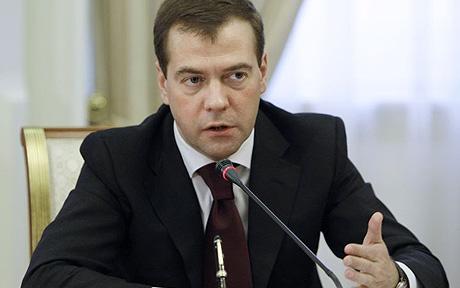An Indo-Russian thaw on a wintry day in Moscow
 Moscow, Dec 9 : On a wintry day in Moscow, Indian Prime Minister Manmohan Singh and Russian President Dmitry Medvedev had a reason to exchange warm smiles that signalled a new warmth in bilateral ties that went through a period of cold shouldering when both countries ended their Cold War alliance to diversify their strategic linkages.
Moscow, Dec 9 : On a wintry day in Moscow, Indian Prime Minister Manmohan Singh and Russian President Dmitry Medvedev had a reason to exchange warm smiles that signalled a new warmth in bilateral ties that went through a period of cold shouldering when both countries ended their Cold War alliance to diversify their strategic linkages.
It was the season's first major snowfall and Moscow city was shrouded in a pristine white blanket. Inside the Kremlin, Manmohan Singh and Medvedev emerged from a meeting, shook hands and smiled at each other in front of a huge media presence in the imposing Malachite Hall.
With a sense of purpose, as was evident from the Indo-Russian joint declaration, the two leaders re-energised their ties after sealing six significant accords, including a virtually no-strings-attached civil nuclear deal, thus ending a frostiness that had clouded bilateral relations.
The prime minister's three-day hectic trip to Moscow, his sixth since becoming the prime minister in 2004, is seen as testament to the "time-tested" ties between the Cold War allies.
Many believe that the "thaw" comes after a period of starchiness and distancing as the Cold War alliance underwent a change and India strategically shifted its focus to the West.
"The thaw was missing for sometime after the Cold War ended and the collapse of the former USSR. There was a feeling of insecurity as it seemed that the two countries were not warming up to each other. India has been displaying a multipolar diplomacy," Egor Alekseev, an Indologist, told IANS.
But India denies that.
Manmohan Singh in his remarks before meeting Medvedev said India's ties with other countries will "never be at the cost of time tested relationship with Russia".
Echoing the prime minister, Indian Foreign Secretary Nirupama Rao said: "Our ties with the US do not affect the stability and solidity of our ties with Russia. They are rock solid."
An Indian official who was travelling with the prime minister to Moscow said: "Russia stands to be India's important strategic partner in energy and arms even as the ties were battered for a while. But they have been revived for good."
The two countries secured a significant civil nuclear deal that besides guaranteeing an uninterrupted fuel supply for Indian nuclear plants also assures New Delhi that Moscow will not interfere in any of India's un-safeguarded nuclear weapon programme.
"The agreement provides for up-front consent for reprocessing of spent fuel. It also includes a provision that Russia will not interfere in our nuclear programme un-safeguarded by the IAEA," the foreign secretary said.
Nuclear, defence and trade accords aside, a major impetus for India-Russia relationship has been the joint declaration signed after Manmohan Singh and Medvedev met over a dinner in the Russian president's private dacha outside Moscow, and a lunch and summit level talks in the Kremlin.
The two leaders were on "the same page", as Rao said, on Afghanistan, Pakistan and other global issues like economic downturn and climate change.
Moscow expressed "solidarity and support" for India's line that Pakistan was yet to bring to justice the perpetrators of Mumbai terror attack.
Laying emphasis on a robust counter-terrorist campaign against Al Qaeda and the Taliban, Russia joined India in cautioning against Pakistan's attempts to draw a line between "good" and "bad" Taliban.
The joint declaration expresses Moscow's support of Indian candidacy in an expanded UN Security Council and New Delhi's "full membership in the SCO" recognising that the Shanghai Cooperation Organization is "an important regional organization promoting peace and stability and fostering economic development in the region".
"The joint declaration together with the significant civil and military pacts the two countries signed symbolises the new found warmth the two countries share," said Alekseev.(IANS)